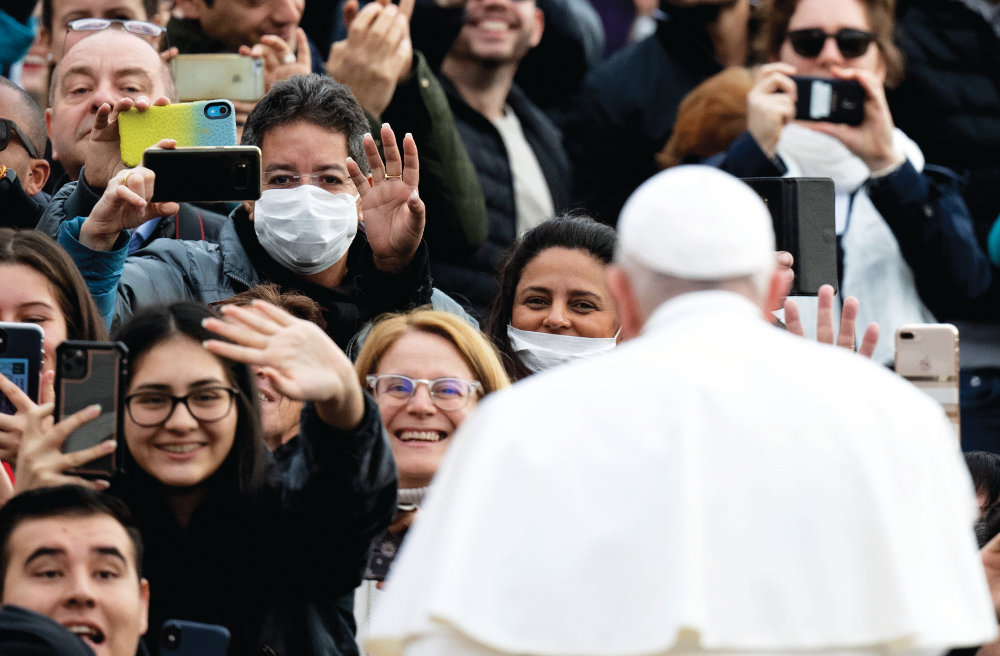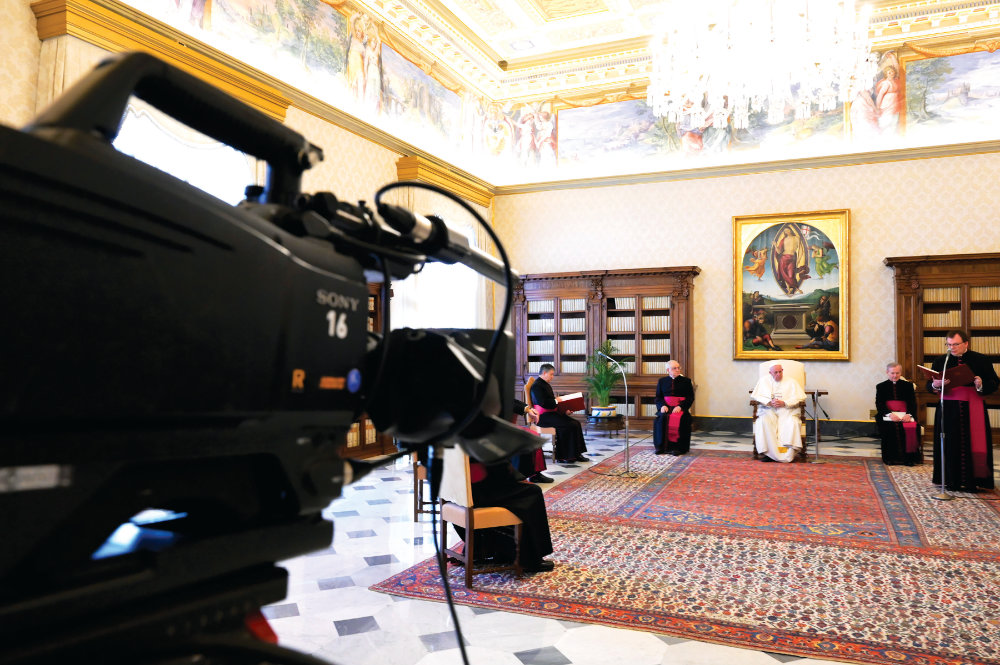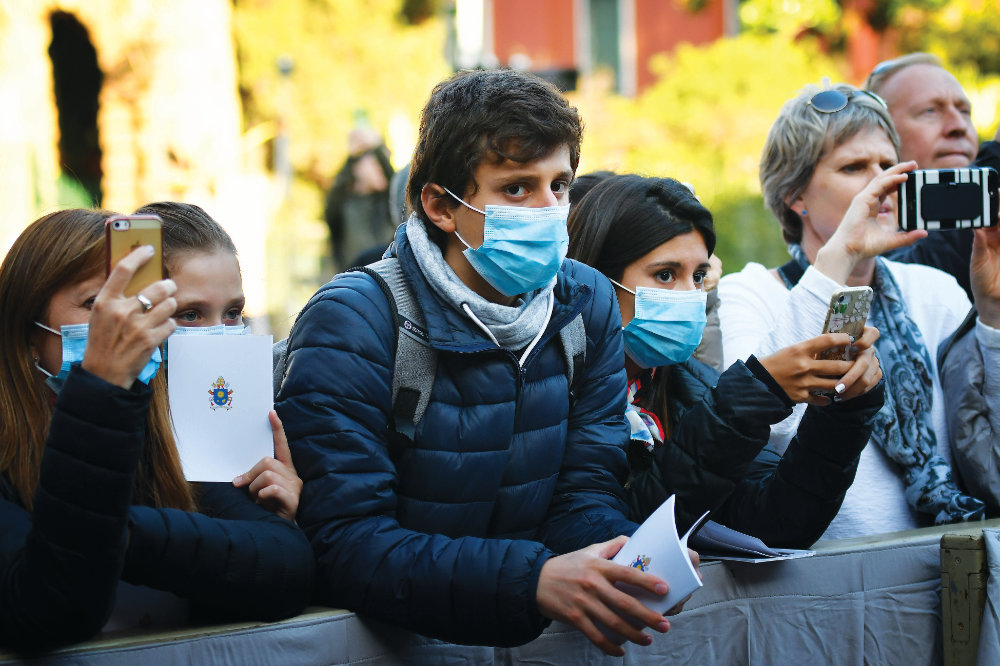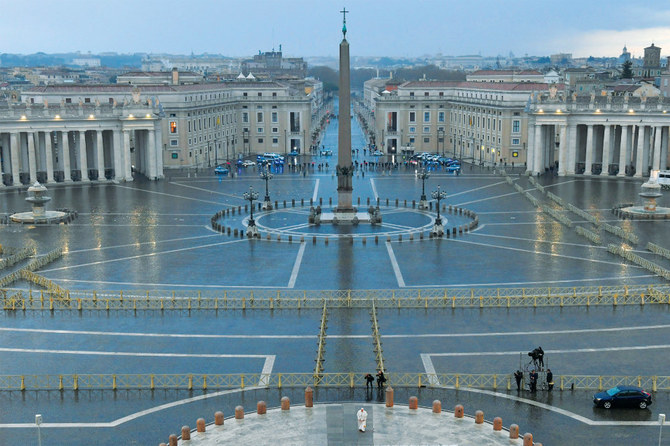ROME: This year, for the first time since the age of the catacombs when Christians had to hide from the Romans, none of the rituals of Catholic Easter normally attended by thousands in the Vatican are open to the public due to the coronavirus threat.
In 2000 years, neither wars nor Nazi occupation, nor plague or any other kind of hardship, have stopped the Pope from celebrating the rituals of the Passion of Christ surrounded by crowds congregating in Rome from every continent.
But that is not an option for Pope Francis in 2020, when humanity is under threat from the COVID-19 pandemic.
This year there will be no crowds in St. Peter’s Basilica, no procession with olive branches on Palm Sunday in St. Peter’s Square, no Via Crucis (Stations of the Cross) at the Colosseum with thousands of people around Rome’s most famous landmark watching the Pope carry the cross on Good Friday.
ALSO READ: Christians in the UAE reflect on Easter under coronavirus lockdown
Those who want to join the Roman pontiff and pray during Easter will have no other option but to watch him on television or via the Internet.
Throughout Italy — where no mass has been celebrated in churches since the end of February to avoid people congregating in churches — all the Holy Week processions have been forbidden by the authorities.
In those situations maintaining social distancing is not an option, so the church accepted a never-before-enacted limitation of its activities even during the busiest churchgoing time of the year.
The Pope is locked in the Vatican, where seven cases of COVID-19 have been reported among priests working for the Roman Curia, the heart of the microstate that 1.3 billion Catholics look to worldwide.

Pope Francis in St. Peter’s Square before the lockdown began. (AFP)
One of the infected is a clergyman living in the Casa Santa Marta, the same motel-style guest house where the pontiff has set up his personal residence, refusing to move into the luxurious papal palace after being elected to succeed Pope Benedict XVI in March 2013.
About 30 people live at the residence, and it was not expected that one of them would become ill because their circle of contacts was so small.
Even Cardinal Angelo De Donatis, who officially serves as the vicar general of the Diocese of Rome on behalf of the Argentine-born pontiff, contracted the virus and had to be hospitalized.
Pope Francis, 83, is considered at high risk of infection. He has only one lung (the other one was surgically removed after an infection when he was young) and he would be exposed to serious danger if he catches the virus.
This is why he has already been tested twice to make sure that he has not caught the virus.
Pope Francis celebrated Palm Sunday Mass at the Vatican. He was inside St. Peter’s Basilica and not outside as usual, in the huge square formed by the Bernini colonnade usually filled every year at this time with at least 100,000 enthusiastic pilgrims waving olive branches.
Wearing his red robe and holding a palm, the Pope said mass from the Altar of the Chair, at the back of the basilica, with only five collaborators helping him with the ritual in an almost empty (only a cardinal and five churchgoers were admitted) building, believed to be the biggest church in the world.
CHRISTIANS IN MENA
Egypt - 4,440,000 (4.7%)
Lebanon - 1,740,000 (38.4%)
Syria -1,260,000 (5.2%)
Iraq - 320,000 (<1%)
Source: Pew Research Center (projections for 2020)
Even the Sistine Chapel choir had its singers, wearing traditional purple robes, operating on reduced numbers to make sure social distancing was enforced.
So begins a very unusual Holy Week, celebrated behind closed doors and without the thousands of faithful who usually flood the Roman streets. The liturgies will only be followed via streaming.
To replace the lack of physical closeness, the Pope has increased his Internet appearances. Now, for example, he live-streams his private daily Mass at 7:00 a.m. in Casa Santa Marta.
He has not canceled any weekly appointments with pilgrims, such as the general audiences on Wednesdays or the Angelus prayer on Sundays, but conducts them via streaming.
“Pope Francis knows extremely well that a shepherd always has to be close to his flock, especially when the hardship is bitter,” Archbishop Claudio Maria Celli, president of the Pontifical Council for Social Communications, Vatican City, told Arab News.
“And he understands the value of the new technologies,” Celli added. “He sometimes criticizes the abuse of social media, but with the COVID-19 outbreak he decided to use it to keep in touch with the faithful worldwide so that they know that no matter what their shepherd is with them, even in topical moments of their faith as the Holy Week and Easter.”

Pope Francis this week during a live broadcast in the library of the Apostolic Palace at the Vatican, during the lockdown to curb the spread of the coronavirus. (AFP)
Celli is the clergyman who persuaded the Pope to open a Twitter account. “Instead of picking up palm branches on Palm Sunday, this year Catholics are being asked to grab their iPads,” he said.
Last week Pope Francis stood alone in the vast Saint Peter’s Square to bless Catholics around the world suffering because of the coronavirus pandemic, urging people to ease their fears through faith.
“Thick darkness has gathered over our squares, our streets and our cities; it has taken over our lives, filling everything with a deafening silence and a distressing void, that stops everything as it passes by,” he said.
In a historic first, the Pope performed the rarely recited “Urbi et Orbi” blessing from the steps of the basilica to an empty square, addressing those in lockdown across the globe via television, radio and social media.
The blessing — which translates as “To the City (Rome) and the World” — is usually given on just three occasions: when a new Pope is elected, and each year at Christmas and Easter. This blessing offers a plenary indulgence on every sin committed for those who receive it.

Visitors wait for Pope Francis to appear at St. Peter’s Square in the Vatican before the lockdown began. (AFP)
He described the coronavirus “tempest,” which he said had put everybody “in the same boat,” and called for people to “reawaken and put into practice that solidarity and hope capable of giving strength, support and meaning to these hours when everything seems to be floundering.”
Earlier this month, when the Italian capital was already in lockdown, Pope Francis made a solitary pilgrimage to two of the city’s churches.
At one, he borrowed a crucifix believed to have saved Rome from plague in the 16th century. That crucifix was placed in front of Saint Peter’s.
Pope Francis’s schedule for Holy Week is now composed of the digital celebration of Mass of the Lord’s Supper on April 9; the celebration of the Passion of the Lord on Good Friday, April 10, and the traditional Via Crucis, which this year will take place at night in front of St. Peter’s Square and not at the Colosseum.
On Saturday, April 11, the Pope will celebrate the Easter Vigil Mass, and on Easter Sunday he will celebrate Mass at 11:00 a.m., after which he will offer the Urbi et Orbi blessing. The rituals will be streamed live from St. Peter’s Basilica.
“This way, that enormous church will not be as empty as it will appear; it will be filled with all our prayers so that the pandemic ends soon,” Celli said.


























